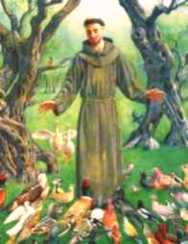 Por Leonardo Boff
Por Leonardo Boff
Una de las primeras cosas que dijo el Papa Francisco fue “cómo me gustaría una Iglesia pobre para los pobres”. Este objetivo está en consonancia con el espíritu de San Francisco, llamado el Poverello, el Pobrecito de Asís. Él no pretendió gestar una Iglesia pobre para los pobres, pues no era realizable bajo el régimen de cristiandad donde la Iglesia tenía todo el poder, pero creó en torno suyo un movimiento y una comunidad de pobres con los pobres y como los pobres.
En cuanto a la extracción de clase, Francisco pertenecía a la próspera burguesía local. Su padre era un rico comerciante de telas. De joven lideraba un grupo de amigos bohemios ̶ jeunesse dorée ̶ que vivía de fiesta en fiesta y cantaba a los juglares del sur de Francia. De adulto sufrió una fuerte crisis existencial. Desde dentro de esa crisis surgió en él una inexplicable misericordia y amor a los pobres, especialmente a los leprosos, incomunicados, en las afueras de la ciudad. Abandonó la familia y los negocios, asumió la pobreza evangélica radical y se fue a vivir con los leprosos. Jesús pobre y crucificado y los pobres reales fueron los móviles de su cambio de vida. Pasó dos años en oración y penitencia, hasta que interiormente escuchó una llamada del Crucificado: "Francisco, vete y repara mi Iglesia que está en ruinas".
Le costó entender que no se trataba de algo material, sino de una misión espiritual. Se fue por los caminos predicando en los burgos el evangelio en lengua popular. Y lo hacía con tanta alegría, "grazie" y fuerza de convicción que fascinó a algunos de sus antiguos compañeros. En 1209 consiguió que el Papa Inocencio III aprobase su "locura" evangélica. Comenzaba el movimiento franciscano que en menos de veinte años tendría más de cinco mil seguidores.
Cuatro ejes estructuran el movimiento: el amor apasionado a Cristo crucificado, el amor tierno y fraterno a los pobres, la "señora dama pobreza", sencillez genuina y gran humildad.
Dejando a un lado los otros ejes, intentemos entender cómo Francisco vio y vivió con los pobres. No hizo nada para los pobres (algún lazareto u obra asistencial), pero hizo mucho por los pobres, pues los incluía en la predicación del evangelio y cuando podía estaba con ellos, pero hizo más: vivió como los pobres. Asumió su vida, sus costumbres, los besaba, limpiaba sus heridas y comía con ellos. Se hizo un pobre entre los pobres. Y si encontraba a alguien más pobre que él, le daba parte de su ropa para ser realmente el más pobres de los pobres.
La pobreza no consiste en no tener, sino en la capacidad de dar y volver a dar hasta expropiarse de todo. No es un camino ascético, sino la mediación para una excelencia incomparable: la identificación con Cristo pobre y con los pobres con los cuales estableció una relación de fraternidad.
Francisco había intuido que las posesiones se interponen entre las personas, impidiendo que se miren a los ojos y que el corazón hable al corazón. Los intereses son lo que se encuentra entre (inter-esse) las personas y lo que crea obstáculos a la fraternidad. La pobreza es el esfuerzo continuo para eliminar las posesiones e intereses de cualquier tipo para que de ahí resulte la fraternidad verdadera. Ser radicalmente pobre para ser plenamente hermano, este es el proyecto de Francisco, de ahí la importancia de la pobreza radical.
Cierto es que la pobreza así de extrema era pesada y dura. Nadie vive solo de mística. La existencia en el cuerpo y el mundo plantea demandas que no pueden ser falsificadas. ¿Cómo humanizar la deshumanización real que comporta este tipo de pobreza? Las fuentes de la época dan testimonio de que los hermanos parecían "homines silvestres (salvajes) que comen muy poco, van descalzos y visten con los peores vestidos". Pero, para sorpresa de todos, dicen que nunca pierden la alegría y el buen humor.
En este contexto de pobreza extrema Francisco da valor a la fraternidad. La pobreza de cada uno es un reto para el otro, para cuidar de él y proporcionarle, mediante la limosna o el trabajo, lo mínimo necesario, darle cobijo y seguridad. Con esto el tener es sustituido en su pretensión de dar seguridad y humanización. Francisco quiere que cada fraile cumpla con la misión de madre para con otro, ya que las madres saben cómo cuidar, especialmente a los enfermos. Sólo el cuidado recíproco humaniza la existencia como lo mostró M. Heidegger en su Ser y Tiempo. Para quienes vivían totalmente desprotegidos, la fraternidad significaba efectivamente todo. El biógrafo Tomás de Celano describe la alegría y el gozo en medio de su pobreza severa. Escribía: "llenos de saudades trataban de encontrarse y estaban felices cuando podían estar juntos, el alejamiento era doloroso, la partida amarga, la separación triste". El despojamiento total les abría al disfrute de las bellezas del mundo, pues no las querían tener, solo saborear.
Muchas lecciones podrían extraerse de esta aventura espiritual. Quedémonos con una: para Francisco las relaciones humanas deben construirse siempre a partir de los que no son y no tienen la visión de los poderosos. Deben ser abrazados como hermanos. Sólo una fraternidad que viene desde abajo y desde ahí engloba a todos los demás, es verdaderamente humana y tiene sostenibilidad. La Iglesia, tal como la tenemos hoy, nunca será como los pobres. Pero puede ser para y con los pobres, como la sueña el Papa Francisco.
To be radically poor so as to fully be a brother
Leonardo Boff
Theologian-Philosopher
Earthcharter Commission
One of the first things Pope Francis said was, “how I would like a Church that is poor, for the poor”. This idea is in consonance with the spirit of Saint Francis, called the Poverello, the Little Poor Man from Assisi. He did not attempt to create a poor Church for the poor, because this was not possible under the regime of Christianity, where the Church had all the power, but he created around himself a movement and a community of the poor, with the poor, living as the poor.
As to his class background, Francis came from the prosperous local bourgeoisie. His father was a rich cloth merchant. As a youth he led a group of bohemian friends ̶ jeunesse dorée ̶ who lived from feast to feast, and sang with the jugglers of Southern France. As an adult he endured a powerful existential crisis. From that crisis there arose within him an inexplicable mercy and love for the poor, especially for the lepers, the outcasts, outside the city. He abandoned his family and business, assuming an evangelical and radical poverty, and went to live with the lepers. Jesus, the poor and crucified one, and the real poor, were the reason for this change of life. He spent two years in prayer and penance, until he heard an inner call from the Crucified: "Francis, go and repair my Church; it is in ruins".
It was hard for him to understand that it was not about something material, but a spiritual mission. He traversed the pathways, preaching the Gospels in the hamlets in the popular tongue. And he did it with such joy, "grazie," and strength of conviction, that it fascinated some of his old companions. In 1209 he convinced Pope Innocence III to approve his Evangelical "madness". There began the Franciscan movement that in less than twenty years would have more than five thousand followers.
Four central ideas underlay the movement: a passionate love for the crucified Christ; a tender and fraternal love for the poor, "dame lady poverty"; genuine simplicity, and great humility.
Leaving aside the other central ideas, let us try to understand how Francis saw and lived with the poor. He did nothing for the poor (a leper hospital or place of care), but he did much with the poor, because he included them in his preaching of the Gospels and stayed with them when he could. But he did more: he lived with the poor. Francis assumed their life, their customs, he kissed them, cleaned their wounds and ate with them. He made himself a poor man among the poor. And if he found someone poorer than himself, he would give him some of his clothes, so as to really be the poorest of the poor.
Poverty does not consist in not having anything, but in the capacity to give and give again until everything has been given away. It is not an ascetic path, but the means to an incomparable excellence: the identification with Christ the poor, and with the poor, with whom he established a fraternal relationship.
Francis had realized that possessions come between persons, such that they could not look into each other's eyes and speak heart to heart. Such interests are what lies (inter-esse) between persons and creates obstacles to fraternity. Poverty is the continuous effort to eliminate possessions and interests of any type, so that from there true fraternity may follow. To be radically poor in order to be fully a brother, that was the project of Francis, hence the importance of radical poverty.
It is true that such extreme poverty was heavy and harsh. No one lives on mysticism alone. Existence in the flesh and in the world make demands that can not be denied. How can one humanize the real dehumanization that this type of poverty entails? Sources from that time offer testimony that the brothers looked like "homines silvestres (savages) who eat very little, walk barefoot and wear the worst outfits". But, to everyone's surprise, they say that they never lacked joy and good humor.
In this context of extreme poverty Francis valued fraternity. The poverty of each one is a challenge for the other, to care for and provide the necessary minimum, shelter and security, for him/her, through handouts or work. In this way, giving security and humanization is substituted for having. Francis wanted each friar to fulfill the mission of mother towards the other, because mothers know how to care, especially for the infirm. Only reciprocal caring humanizes existence, as Martin Heidegger showed in his Being and Time. For those who lived totally unprotected, such fraternity in effect meant everything. Biographer
Tommaso da Celano described the happiness and joy amidst this severe poverty. Da Celano would write: "filled of saudades, they tried to find each other, and were happy when they could be together; distance was painful, farewells were bitter, separation sad". Being totally distant opened for them the pleasures of the beauties of the world, because they did not want to possess them, only to enjoy them.
Many lessons could be taken from this spiritual adventure. Let's keep one: to Francis, building human relationships must always start with those who are not and do not have the vision of the powerful. They must be embraced as brothers and sisters. The only fraternity that is truly human and sustainable is that which comes from below and from there embraces all others. The Church, such as she exists now, will never be like the poor. But she can be for and with the poor, as Pope Francis dreams of her becoming.
Leonardo Boff
06-14-2013

